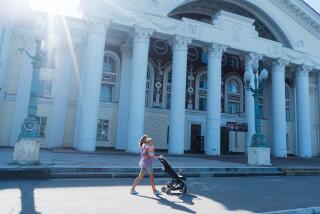Postscript : In Russia, if the Price Is Right . . . : Even the country’s space heroes have been robbed of their glory.
- Share via
MOSCOW — David E. Guggenheim traveled to northern Moscow to see the mementos of one of his personal heroes, Soviet cosmonaut Yuri A. Gagarin.
To his horror, he found the first human being in space has been posthumously pressed into duty as a used-car salesman, a pitiful emblem of how much has changed in post-Soviet, capitalist Russia.
It happened at the Cosmos pavilion, an exhibit of Soviet space feats that used to be a veritable shrine for Soviets and a regular stop for foreign tourists here, but whose present fate--along with Gagarin’s--shows that even Russia’s national heritage can be bought and sold if the price is right.
“My pulse quickened as I envisioned the history that awaited me inside,” recalled Guggenheim, vice president of EcoAnalysis, an environmental consulting firm based in Ojai, Calif.
But Guggenheim, who was in Moscow on a recent business trip, found that the exhibit’s main doors were locked.
Ducking through an unmarked side entrance, Guggenheim managed to get inside the gigantic hall, which resembles an aircraft hangar with an elegant glass dome slapped on top.
“A huge mural of Yuri Gagarin, the great cosmonaut hero, greeted me,” wrote Guggenheim in an account he provided to The Times. “I immediately recognized Sputnik, Proton and other satellites displayed above. There were various spacecraft from manned Soviet missions, even a Soyuz-Apollo mock-up.
“But was that a Ford Tempo parked beside it? And wasn’t that a Dodge Aries parked by the Proton? My God, it was a used car lot! I was dumbfounded!” he recalled. “It was profoundly sad to me that the Russian people, robbed of so much under 70 years of misguided Bolshevik rule, have so little left to hang on to. Now they are even robbed of the glory of their past as Yuri Gagarin helplessly becomes the emblem of a used car lot.”
What Guggenheim discovered is just one of the changes that have overtaken the vast exhibit grounds commissioned in the 1930s by Soviet leader Josef Stalin to bolster people’s pride in the achievements of the Communist system.
Stalin spared no expense in creating a park that was half museum and half Soviet Disneyland, complete with gilded fountains, amusement park rides and elegant marble pavilions, each a tribute to a certain aspect of the Soviet economy--from coal mining to beekeeping.
Now, the fairgrounds might better be called the Exhibition of the Economic Schemes of Budding Russian Capitalists (though the name has been officially changed to All-Russian Exhibition Center).
Dozens of the 80 pavilions have ceded some or all of their space to commercial ventures.
A store selling Barbie dolls has cropped up in the Health Pavilion.
In the building where the achievements of the Soviet potato industry were once celebrated, salesmen now hawk French-made Citroen cars.
When the Cosmos exhibit closed for repairs, the Azerbaijani-run firm Condor moved in, showing and selling used American cars imported from New York and Detroit.
The dealers see nothing bizarre about it all. “We just rent space here, and it’s a very good place to sell cars,” Rafael Mamedov, the firm’s president, explained.
Officials estimate 40,000 people visit the park every weekday and 100,000 on Saturday and Sunday.
Russian citizens and firms, rather than foreigners, buy most of the 30-plus vehicles Condor sells each month.
Prices range from 1.5 million rubles ($3,500 at current exchange rates) for small cars like a two-door Plymouth to 3.5 million rubles ($8,200) for luxury four-doors like a Cadillac.
The average Russian takes home the ruble equivalent of $15 a month.
“This Condor company is only temporary,” Aleksei A. Grechinik, deputy director of science exhibits at the park, assured a Western reporter. He said he was saddened that young Russians who had never visited the Cosmos exhibit have been deprived of its inspirational value, but he hopes it will reopen in the near future.
That’s not what the Condor Co. thinks. They plan to branch out shortly into airplane sales.
More to Read
Sign up for Essential California
The most important California stories and recommendations in your inbox every morning.
You may occasionally receive promotional content from the Los Angeles Times.










